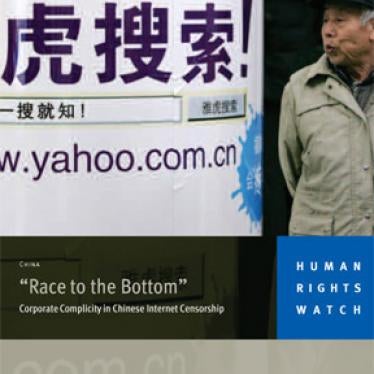(New York) - The computer industry should make it clear to the Chinese government that it will not cooperate in efforts to curtail access to information on the internet through government-mandated or provided filtering software such as the "Green Dam Youth Escort" program, Human Rights Watch said today.
Despite domestic and international criticism, the Chinese government has apparently not reversed its initial demand that companies pre-install Green Dam on all personal computers by July 1. This week, a Washington-based group representing leading information technology companies issued a brief statement urging the Chinese government to "reconsider implementing its new mandatory filtering software requirement," but to date has received no response indicating the new requirement would be rescinded.
"The government's order to install censorship software represents a grave threat to freedom of expression in China," said Arvind Ganesan, Business and Human Rights Program director at Human Rights Watch. "The Green Dam technology highlights Beijing's ongoing efforts to intensify its chokehold on Chinese citizens' internet access and the need for computer software and hardware firms to resist complicity in those efforts."
Green Dam is ostensibly designed to filter out pornography and other "unhealthy information" from the internet, but reportedly is also programmed to censor content ranging from political information to websites catering to the needs of China's lesbian, gay, bisexual, and transgender community. Green Dam is not transparent and does not facilitate users choosing which sites or terms to block or allow. Numerous commercial parental-control software packages are already widely available in China, including products sold by Microsoft.
Human Rights Watch said that instead of providing the promised protections, the Green Dam software could instead pose a serious new threat to free expression if industry leaders do not actively oppose any new efforts by the Chinese government to reintroduce mandatory pre-installation of Green Dam or other filtering software in the future. In addition to the censorship threat, the software could further intrude on user privacy, undermine user choice, and have the potential to make multinational companies complicit in those efforts.
According to the Open Net Initiative and other research institutions, Green Dam has serious security vulnerabilities that leave users vulnerable to hacking and could ultimately allow the government to track users' browsing habits and communications. While the Chinese government has recently announced that it would issue security patches to fix some flaws in the software, it is not a sufficient step to address all the problems that the software creates for human rights.
"The controversy over Green Dam is just the latest attempt to make computer, software and internet companies complicit in China's attempts to censor the internet," said Ganesan. "It is critical for the industry to draw a line and make it clear to the government that it won't sacrifice ethical principles and international human rights standards for profit."
In a letter to major computer makers, including Dell, Hewlett-Packard and Lenovo, Human Rights Watch expressed concern about the May 19 directive, "Notification Regarding Requirements for Pre-Installing Green Filtering Software on Computers," and its human rights implications for companies in China and abroad.
Human Rights Watch called on the computer industry to address in a systematic manner the problems posed by the Green Dam directive in China and other efforts to curtail online freedoms in other countries. A meaningful next step is to adopt and implement robust policies and procedures to safeguard human rights, such as those promoted by the Global Network Initiative, a multi-stakeholder effort created in 2008 to protect freedom of expression and privacy online.
"This episode shows how vital it is for the technology industry to stand together on principle, implement standards to protect human rights, and oppose government requirements that could force them to aid censorship in China," said Ganesan.
The Chinese government has already developed the world's most advanced system of internet censorship and surveillance, known as the "great firewall." Chinese citizens who post content considered by the government to be "sensitive" on overseas websites are liable to severe official reprisals. For example, the journalist Shi Tao is serving a 10-year sentence for "divulging state secrets abroad" after he was arrested in November 2004 for posting notes from a directive issued by China's Publicity Department (formerly known as the Propaganda Department) on how to handle the 15th anniversary of the 1989 military crackdown in Tiananmen Square. Shi's conviction followed Yahoo!'s disclosure of his identity to Chinese security officials.
According to an analysis of Green Dam 3.17 by the Open Net Initiative, the software sets its defaults at a high level of filtering and presents difficulties in customizing. The default setting does not just block sites, but kills all applications running on the computer. The software auto-update function can add new sites and terms to block, and could potentially be used to enable the software to monitor users.
"When the government mandates software that blocks political and religious sites and hampers user choice, it is not providing a service but a government censor by proxy," Ganesan said.







